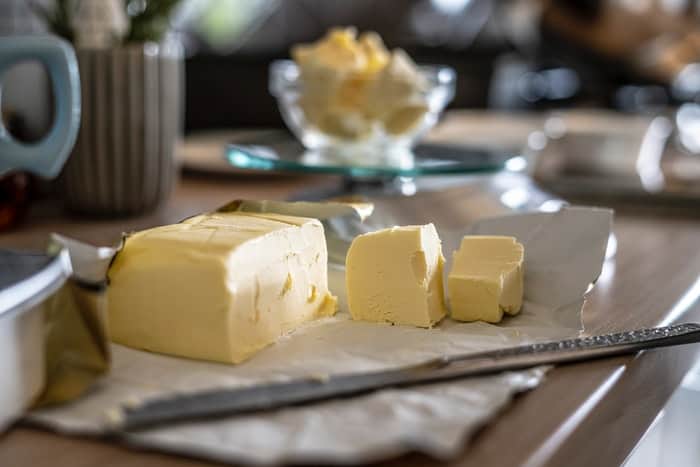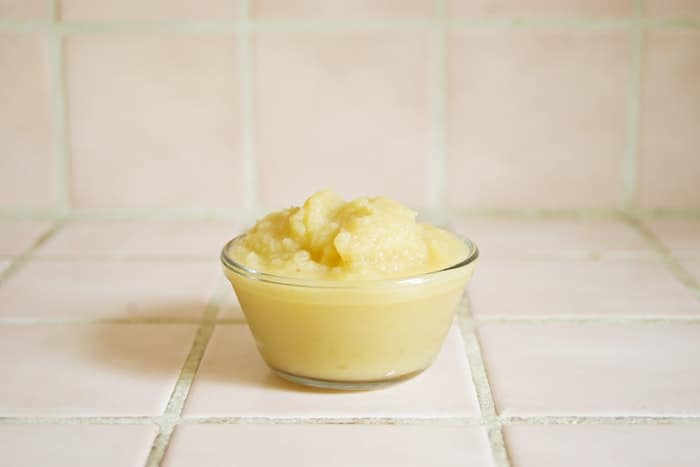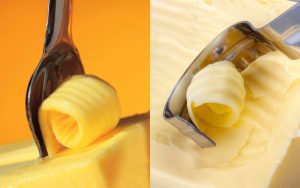As more people embrace a vegan lifestyle or have dietary restrictions, vegan butter has become a popular alternative to traditional dairy butter. But how long does vegan butter actually last? Can it spoil?

In this comprehensive guide, we will delve into the world of vegan butter, explore its shelf life, and provide you with valuable insights on how to determine if it has gone bad. So, let’s dive in and discover everything you need to know about the shelf life of vegan butter!
Shelf Life of Vegan Butter
Understanding the shelf life of vegan butter is essential for ensuring its quality and safety. While vegan butter is a plant-based alternative to traditional dairy butter, it is still a food product that can undergo spoilage over time. In this section, we will explore the factors that affect the shelf life of vegan butter and provide insights into its average longevity.
Factors Affecting Shelf Life
Several factors can influence the shelf life of vegan butter, including the ingredients used, preservatives added, storage conditions, and packaging. Vegan butter is typically made from a combination of plant-based oils, such as coconut oil, avocado oil, or soybean oil, along with emulsifiers and flavorings. Some brands may also include preservatives to extend the product’s shelf life.
Storage conditions play a vital role in determining how long vegan butter stays fresh. Exposure to heat, light, and air can accelerate spoilage, so it’s important to store vegan butter properly. Additionally, the type of packaging used for vegan butter can impact its longevity. Airtight containers or wraps can help preserve the quality of vegan butter by preventing oxidation and limiting exposure to external elements.
Average Shelf Life
While the exact shelf life of vegan butter may vary depending on the brand and specific ingredients used, most commercially available vegan butter products have a shelf life of several months. It’s important to note that vegan butter typically lasts longer than traditional dairy butter due to its lack of animal-based components, such as milk solids. However, it is still subject to degradation over time.
To determine the specific shelf life of a particular vegan butter product, it’s best to refer to the manufacturer’s label or packaging. Many brands provide a “best by” date or an expiration date, indicating the recommended timeframe for consuming the product at its peak quality. Following these guidelines will help ensure that you are enjoying vegan butter within its intended shelf life.
Signs of Spoilage in Vegan Butter
Being able to recognize the signs of spoilage in vegan butter is crucial for ensuring food safety and avoiding the consumption of rancid or spoiled products. In this section, we will discuss the visual changes, odor and taste changes, as well as the importance of expiration dates and best-by labels when determining the quality of vegan butter.
Visual Changes
One of the first indicators of spoilage in vegan butter is visual changes in its appearance. Mold growth or unusual discoloration, such as green, blue, or black spots, can signify that the butter has gone bad. Additionally, if you notice any separation or texture changes, such as a grainy or curdled consistency, it could indicate that the vegan butter has started to deteriorate.
Odor and Taste Changes
Another way to detect spoilage in vegan butter is through changes in its odor and taste. Rancidity is a common issue with fats and oils, including vegan butter. If you notice a strong, unpleasant, or sour smell coming from the butter, it is likely a sign of rancidity. Similarly, if the taste of the vegan butter is off, has a bitter or sour flavor, it’s best to discard it.

Expiration Dates and Best-By Labels
Most commercially available vegan butter products come with expiration dates or best-by labels, indicating the recommended timeframe for consuming the product at its best quality. These dates serve as a guideline for determining when the vegan butter may start to lose its freshness and flavor. It’s important to pay attention to these labels and not consume vegan butter past its expiration date.
Proper Storage of Vegan Butter
Properly storing vegan butter is essential for maintaining its freshness and preventing spoilage. Whether you opt for refrigeration or room temperature storage, following the right storage techniques can significantly extend the shelf life of your vegan butter. In this section, we will explore the benefits of refrigeration versus room temperature storage and provide practical tips for storing vegan butter effectively.
Refrigeration vs. Room Temperature
Refrigeration is generally the preferred method for storing vegan butter as it helps maintain its quality and prevents spoilage. Keeping vegan butter refrigerated slows down the oxidation process, which can cause rancidity. It also helps preserve the texture and consistency of the butter. Refrigerating vegan butter is particularly important in warmer climates or during the summer months when room temperature can fluctuate.
However, if you choose to store vegan butter at room temperature, ensure that the ambient temperature is consistently cool, ideally below 70°F (21°C). Exposing vegan butter to high temperatures can lead to faster degradation and spoilage.
Tips for Storing Vegan Butter
Regardless of whether you refrigerate or store vegan butter at room temperature, there are a few tips to keep in mind:
- Airtight containers or wraps: Store vegan butter in airtight containers or wrap it tightly in plastic wrap or foil to minimize its exposure to air, which can cause oxidation and spoilage.
- Avoiding cross-contamination: When storing vegan butter, ensure that it is kept separate from other strong-smelling foods in the refrigerator to prevent absorption of odors.
- Maintaining consistent temperature: If refrigerating vegan butter, make sure your refrigerator is set to a consistent temperature to prevent fluctuations that could compromise the quality of the butter.
By following these storage tips, you can maximize the shelf life of your vegan butter and enjoy its freshness for a longer period.
Extending the Shelf Life of Vegan Butter
If you find yourself with excess vegan butter or want to prolong its shelf life, there are a couple of effective methods to consider: freezing vegan butter and making homemade vegan butter. These techniques can help you extend the usability and freshness of your vegan butter.
Freezing Vegan Butter
Freezing vegan butter is a great option if you have surplus butter or want to keep it for an extended period. Freezing helps halt the deterioration process, allowing you to store vegan butter for several months. Here’s how you can freeze vegan butter:
- Cut the vegan butter into smaller portions or cubes for convenience.
- Wrap each portion tightly in plastic wrap or place them in airtight containers to prevent freezer burn and protect against moisture.
- Label the wrapped portions with the date to keep track of their freshness.
- Place the wrapped portions in the freezer, ensuring they are stored in a stable position.
When you need to use the frozen vegan butter, simply thaw the desired portion in the refrigerator overnight or gently defrost it using the defrost setting on your microwave. It’s important to note that the texture of vegan butter may change slightly after freezing, but it will still be suitable for cooking and spreading.
Making Homemade Vegan Butter
Another way to extend the shelf life of vegan butter is by making it at home. Homemade vegan butter allows you to have complete control over the ingredients and preservatives used, ensuring a longer storage life. Here are some steps to make homemade vegan butter:
- Choose a recipe that suits your preferences and dietary needs. There are various recipes available online that use ingredients like coconut oil, plant-based milk, and emulsifiers.
- Gather the necessary ingredients and equipment.
- Follow the recipe instructions carefully, ensuring proper measurements and techniques.
- Once the homemade vegan butter is ready, store it in airtight containers or wrap it tightly to protect it from air and moisture.
The shelf life of homemade vegan butter may vary depending on the recipe and storage conditions, so it’s advisable to follow the guidelines provided in the recipe or use-by dates for guidance.
When to Discard Vegan Butter
Ensuring food safety is paramount when it comes to consuming any type of butter, including vegan butter. It’s crucial to be aware of the signs that indicate vegan butter has gone bad and to know when it’s necessary to discard it. In this section, we will explore the safety considerations and the importance of trusting your senses when determining the freshness of vegan butter.
Safety Considerations
The growth of bacteria and the potential for foodborne illnesses are significant concerns when it comes to spoiled butter. Vegan butter is no exception. Consuming spoiled vegan butter can lead to digestive issues and pose health risks. It’s essential to prioritize food safety and take necessary precautions.
Common pathogens in spoiled vegan butter may include bacteria such as Salmonella, Listeria, or Clostridium botulinum. These pathogens can cause severe illness if ingested. Therefore, it’s important to handle and store vegan butter properly to minimize the risk of bacterial contamination and subsequent spoilage.
Trust Your Senses
When it comes to determining the freshness of vegan butter, your senses can be reliable indicators. If you notice any significant changes in the appearance, smell, or taste of vegan butter, it’s best to err on the side of caution and discard it. Trusting your senses is key to avoiding the consumption of potentially harmful or rancid butter.
Visual changes, such as mold growth, unusual discoloration, or texture changes, should be considered red flags. If the butter develops an off-putting odor, rancid smell, or tastes bitter, sour, or different from its usual flavor, it’s a clear indication of spoilage.
Remember, when in doubt, it’s better to discard vegan butter rather than risk consuming a product that may pose health hazards.
Conclusion
Understanding the shelf life of vegan butter is crucial for maintaining food safety and enjoying its best quality. While vegan butter does have a shelf life, it can be extended by proper storage and handling techniques. By paying attention to visual changes, odor, taste, and expiration dates, you can easily detect spoilage and prevent the consumption of rancid butter. Remember to refrigerate or freeze your vegan butter, use airtight containers, and follow storage guidelines provided by the manufacturer.








